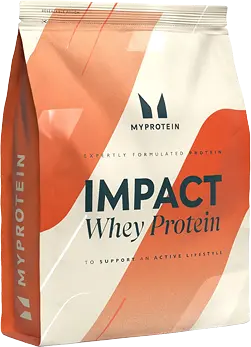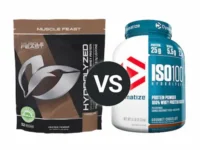Knowledge BaseYou're Questions Answered
How much protein is in whey protein powder?
Whey protein powder is a highly popular dietary supplement known for its fast-digesting properties and rich amino acid profile. It is derived from the liquid portion of milk that separates during cheese production. Whey protein powder is available in various forms, including concentrate, isolate, and hydrolysate, each offering different protein concentrations. The protein content in whey protein powder varies depending on these forms and the specific product formulation.
Protein Content in Whey Protein Powder
1. Whey Protein Concentrate
Whey protein concentrate typically contains 70-80% protein by weight. This means that a 30-gram serving (about 1 scoop) usually provides approximately 21 to 24 grams of protein. The remaining content consists of carbohydrates, fats, and other components1.
2. Whey Protein Isolate
Whey protein isolate is a more refined form of whey protein, containing at least 90% protein by weight. It has most of the fats and carbohydrates removed, making it a more concentrated protein source. A 30-gram serving of whey protein isolate generally provides around 27 to 29 grams of protein.
3. Whey Protein Hydrolysate
Whey protein hydrolysate is whey protein that has been partially broken down through a process called hydrolysis. This makes it easier to digest and absorb. The protein content of whey hydrolysate can be similar to that of whey isolate, typically around 90-94% protein by weight. A 30-gram serving usually contains about 27 to 29 grams of protein, depending on the degree of hydrolysis and additional processing.
Nutritional Profile and Benefits
Whey protein is considered a complete protein because it contains all nine essential amino acids necessary for human health. It is particularly rich in branched-chain amino acids (BCAAs), such as leucine, isoleucine, and valine, which are crucial for muscle protein synthesis and recovery. Whey protein is also known for its high biological value (BV), indicating the efficiency with which the body can utilize the protein4.
Usage and Considerations
Whey protein powder can be used in various ways, including as a post-workout shake, in smoothies, or as an ingredient in recipes for protein-rich snacks and meals. It is especially beneficial for those looking to support muscle growth and recovery due to its rapid digestion and absorption. However, individuals with lactose intolerance or dairy allergies should exercise caution, as whey protein can contain varying amounts of lactose. Whey protein isolate, with its lower lactose content, may be a better option for those with lactose intolerance.
- Smithers, G. W. (2008). Whey and whey proteins—from ‘gutter-to-gold’. International Dairy Journal, 18(7), 695-704.
- Wolfe, R. R. (2015). Update on amino acid requirements: The challenge of determining the amino acid requirements for human adults. The Journal of Nutrition, 145(8), 2030S-2038S.
Related Questions

Your Answer
We are a participant in the Amazon Services LLC Associates Program, an affiliate advertising program designed to provide a means for us to earn fees by linking to Amazon.com and affiliated sites.






